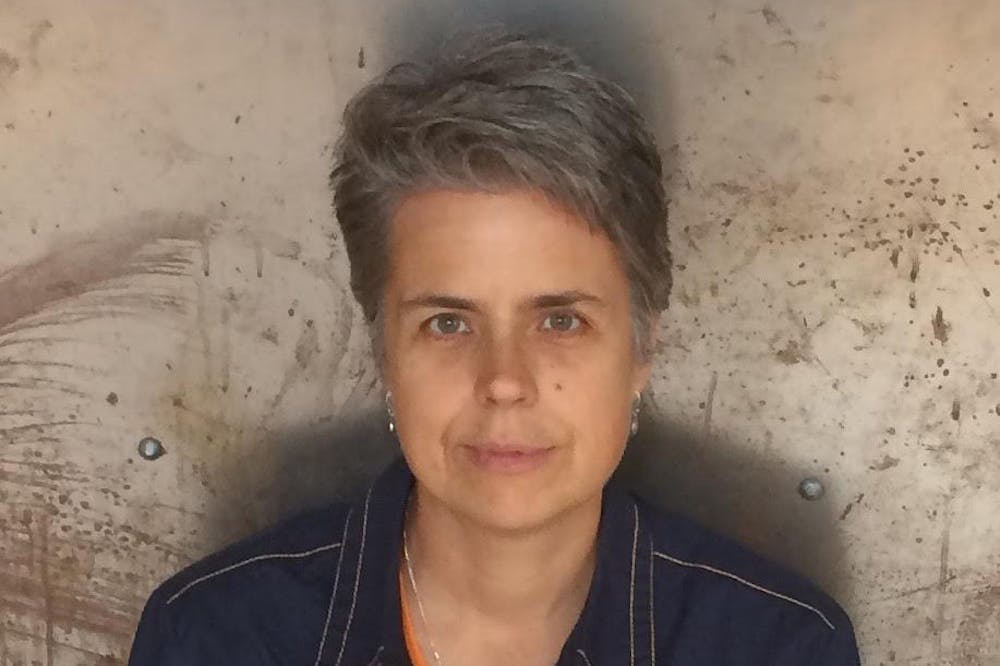Chemistry Prof. Cassandra Fraser aims to combine chemistry and real world issues with the development of her new Real World Chemistry Lab.
Fraser currently directs a research group that studies luminescent materials, or materials that emit light without additional energy input. Using phosphorescence — a type of luminescence, common to glow-in-the-dark items, that does not immediately re-emit absorbed radiation and allows diffusion of light at lower intensities for longer times — they are working to learn new ways of applying light-emitting materials to products, including researching ways that materials used by sensors can be improved.
As with many other aspects of her professional career, Fraser’s research involves numerous interdisciplinary applications, as the lab’s focus on imaging and sensing devices has uses in everything from biology to art and design.
Additionally, Fraser has devised and taught various courses including Metals and Medicine in the Environment, which focused on the different ways metals enter human bodies and their health implications. Along with creating original courses, she has also taught graduate level Transition Metal Chemistry and currently instructs undergraduate Organic Chemistry.
After 23 years as a professor at the University, Fraser plans to take a sabbatical in the 2018-19 school year in order to pursue a new chapter in her career. Instead of teaching, she will research various elemental and molecular case studies in the non-academic world and work to apply them to university classes and potential discoveries.
To begin, Fraser hopes to oversee a complete renovation of her current workspace into what she calls the Real World Chemistry Lab. This new workspace will function as both a traditional research space as well as a media lab, where other collaborators — such as artists or architects — can help devise creative ways to communicate their discoveries.
“As scientists, we’re not really paying attention to how what we’re doing is connected, but at this stage in my career, I want to turn my attention outward and say ‘Where does copper come from’ and ‘What would happen if you had a mine in your community?’” Fraser said with regards to her research angle.
She plans to purchase a van in order to allow necessary transportation for herself and students to observe case studies of chemistry first-hand.
“We can take the van and go out into the real world to try and see with our own eyes and gain an understanding of these things,” Fraser said. “Then we can think about how we want to communicate that.”
During this time off, Fraser also intends to devise a course on “anthrochemistry,” a term she coined to describe her studies on the social and real-world applications of chemistry.
This course will be prototyped by Fraser during her time on sabbatical and based on her experiences with the Real World Chemistry Lab. It will include molecular and elemental case studies related to social and political issues and aspects of traditional chemistry courses.
Her unique academic perspective has left an imprint on the academic and undergraduate community, winning her various awards and fellowships.
Fraser has received the Cavaliers Distinguished Teaching Professorship Award, which is given to professors recognized for their outstanding teaching of undergraduates, and was inducted into the University Teaching Academy for her assistance to other faculty and graduate teaching assistants.
Her colleague, Chemistry Prof. Laura Serbulea, commented on her work and character.
“Last year, she received two teaching awards and, in addition to that, received an award from one of the Secret Societies,” Serbulea said. “So that speaks to her ability to engage students in the classroom.”
Fraser is also the Director of Diversity and Inclusion for the Department of Chemistry, a position that her colleagues, including Serbulea, support due to her care for students in her classes and research groups.
Her inclusivity as a professor has not gone unnoticed by her students and colleagues.
“I really admire her, because in terms of her character, she is someone who is really motivated by … her desire to transmit knowledge to other people and also to empower people who have historically struggled to acquire knowledge for different reasons,” Jennifer Sachs, a current teaching assistant in Fraser’s Organic Chemistry class, said.
Once she returns to the University following sabbatical, Fraser said she hopes to expand the Real World Chemistry Lab by incorporating undergraduate research with an emphasis on collaboration with other departments. Fraser would recruit students from various fields, including STEM and art, and work together to publish interdisciplinary research — including art and media projects.







